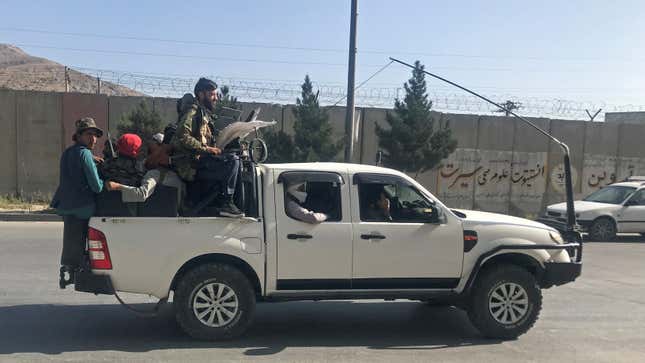
Good morning, Quartz readers!
This is the third edition of the refreshed Weekend Brief, where every Saturday we break down a big story, and share our favorite links from Quartz and elsewhere.
Starting in September, the Weekend Brief will be exclusive to Quartz members. That means it’s a great time to subscribe (take 50% off while you’re at it). And if you’re already a Quartz member, 🎩 hat’s off to you.
Okay, let’s get started.
Funding the Taliban
As American troops withdrew from Afghanistan, the Taliban only needed about a week to capture Kabul, occupy the presidential palace, and complete their second takeover of a country they’d once ruled.
But the takeover might have been the easy part. This week, the US government froze all of Afghanistan’s assets in American bank accounts—including nearly $1.25 billion in gold in a New York vault—and the International Monetary Fund suspended a $450 million line of funding that was due to kick in on Aug. 23.
As a result, the Taliban can’t touch the bulk of Afghanistan’s reserves overseas—money it presumably needs, whether to rearm itself after years out of power or to import critical goods. One former official of the Afghanistan central bank, who had fled Kabul just as the city fell, estimated on Twitter that the Taliban can only access 0.1-0.2% of Afghanistan’s $10 billion or so in international reserves.
But to expect these indefinite sanctions to provide much leverage over the Taliban—to make it comply with human rights laws or abandon violence—is too optimistic. In part, this is because Afghanistan was never deeply integrated into the global financial system in the first place. Its economy is largely an informal one. It runs on cash earned not just from the trafficking of drugs but also from the fees raised—some would say extorted—as taxes to allow goods to traverse the trade routes through Afghanistan. Other wealthy powers, such as China or Russia, may be more willing to fund the Taliban (or at least to overlook its human rights record) in return for access to Afghanistan’s mineral resources or other strategic assets.
Afghanistan’s citizens already live hard lives in one of the world’s poorest countries. In 2020, when a Covid-induced recession set in, foreign aid accounted for around 43% of the country’s GDP, according to the World Bank. Without that aid, and with an economy that will become even less transparent under the Taliban, the people who suffer most will be, as ever, the people of Afghanistan. —Samanth Subramanian
The backstory
- President Biden doubled down on the decision to withdraw. Speaking from the White House on Tuesday, he said, “there was never a good time to withdraw US forces. That’s why we’re still there.”
- The US has been in Afghanistan for 20 years… Two decades and four presidential administrations have brought us to this point. What was the strategy, anyway?
- …And it never really reconstructed the country. Shifting goals, cutting corners, and corruption were in part to blame, according to a recent US government report.
Unlikely customer
For more than a quarter-century, Toyota’s sturdiest pickups and SUVs have been the Taliban’s vehicles of choice. They’re rugged enough for Afghanistan’s terrain, and they have air-conditioning to beat the summer heat. As in troubled regions all over the world, the Toyota was indispensable to the Taliban’s ambition to control a population scattered over difficult terrain.
It wasn’t exactly the kind of association that made Toyota proud. Which makes the company seem prescient today for an odd rule it instituted in late July, in an attempt to prevent its vehicles from being used by sanctioned groups like the Taliban.

What to watch for next
- What happens to women. Though the government has invited women to participate in the government and promised to respect their right to study and work, the situation on the ground suggests women could lose the rights they only recently attained.
- How India reacts. The country will be watching closely to see how Pakistan relates to Afghanistan, since history suggests that a Taliban-controlled Afghanistan has contributed to militancy and conflict in Kashmir. India has also invested billions of dollars in Afghanistan’s power generation, roads, and historical sites; its leaders may worry that its long-established trade partner could challenge that relationship.
- Whether Russia and China maintain their geopolitical foothold. The two countries were among the few to not evacuate their citizens once the Taliban seized control, an indication that they might continue their diplomatic relationships. China may even use the moment to show its enemies that the US is a declining power.
- Countries that provide asylum for displaced Afghans. So far Uganda has agreed to temporarily accept 2,000 refugees, even as the US scrambles to remove its collaborators from the country and leans on its allies to put them up. Other countries that have agreed to take in refugees include Albania, Kosovo, Macedonia, Tajikistan, the UK, Iran, Qatar, India, and Canada.
- Unintended consequences. One such surprising development: The Taliban is now in control of a trillion-dollar deposit of lithium, a mineral crucial to the world’s clean energy economy.
What you can do
This week’s news cycle has been a heavy one. The photos and videos of the intimidation of Taliban soldiers, the reports of thousands of people desperate to leave the country, people beaten down in their attempts to protest—it’s truly awful, no matter what you think of president Biden’s decision to withdraw.
Fortunately, there are ways to help. We’ve made (and continue to update) a list of organizations deserving of your donation. And though it’s mostly up to international governing bodies to hold the Taliban accountable for their treatment of women and make sure dissenting voices get heard, you can show them that you think it’s important they keep doing this work.
7 Quartz stories to spark conversation
🚙 The US used-car bubble has burst
🛍️ Ethical consumption can’t be the burden of shoppers alone
😷 Has Covid-19 gone from pandemic to endemic?
💼 A $3 million insider trading case tests Netflix’s culture of transparency
🤩 A Senegal-born factory worker is Europe’s first TikTok megastar
🚀 Why Jeff Bezos and Blue Origin are suing NASA
😨 Xi Jinping just sent a bleak message to China’s super rich
5 great stories from elsewhere
📚 There’s a real-life crime thriller in publishing. A hacker has spent years imitating influential people in the world of book publishing to get their hands on buzzy manuscripts. But to what end? Vulture tries to solve the mystery.
🐦 How Black Twitter became a cultural force. Wired’s three-part oral history of Black Twitter reflects the power of finding your community online.
⚗️ Scientists are bringing their jargon to African languages. Nature reports on a project called Decolonise Science, which will translate 180 research papers into six African languages.
😵💫 Disinformation was part of American lives well before social media. Harpers has a beautifully written treatise on disinformation, the techlash, and digital advertising.
😬 Read the allegations that cost Mike Richards his job. Days before the newly appointed Jeopardy! host stepped down, The Ringer reported on concerning comments and alleged decisions he made in years prior.
Thanks for reading! And don’t hesitate to reach out with comments, questions, or topics you want to know more about.
Best wishes for a thoughtful weekend,
Samanth Subramanian, senior reporter (can’t stop thinking about the people fleeing Kabul)
Alex Ossola, membership editor (donated to Rukhshana Media)
